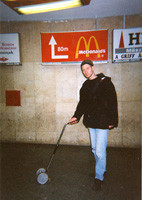Using a measuring wheel borrowed from the police, the
exact distance was measured from each advertising board in Nyugati underpass
to the entrance of each advertised establishment. In the same colour and
graphics as the original 'claimed' distance, the correct distance was
then overlaid in cut out sticky plastic numbers. e.g. Company: McDonalds.
Claimed distance: 80m. Measured distance: 142.03m.
This project was intended to be made only with the McDonalds' signs (see below) but was later extended to include all advertising boards in the underpass that stated distances. The idea came from reading about the verdict of the 8 year 'McLibel' trial in the UK, in which the fast food giant McDonalds won a pyrhic legal victory over two unemployed environmental activists from a small green anarchist group, London Greenpeace, on a point of accuracy (http://www.mcspotlight.org/case/trial/story.html).
The two activists had distributed a simple black and white photocopied leaflet outside McDonalds restaurants in London, listing various objections to McDonalds' work practices such as their poor working conditions, rates of pay, recycling policy, treatment of animals, clearing of rainforest for cattle grazing and misleading advertising that targeted children with unhealthy products. During the course of the trial, the activists, giving their own defence, captured the spotlight of the media and by elaborating each point in detail were able to reach a far greater public and cause McDonalds more embarrassment than the handing out of a leaflet ever could. In the end the judge ruled that although the activists were right on a number of points, some facts and figures were exaggerated or inaccurate to a point that he considered McDonalds to have cause to claim damages. The activists left the court and immediately started handing out the exact same leaflet to passers by, knowing that McDonalds wouldn't dare raise a challenge and risk putting themselves under such high profile media scrutiny again. If the 'McLibel' case was about losing on a point of accuracy, then the absurdly pedantic 'distance correction' project, choosing the most banal of critiques, would not only be beyond legal challenge, but imply that a further skepticism about corporate information and activity be encouraged.
Most of the alterations remained in place for at least a year.
This project was intended to be made only with the McDonalds' signs (see below) but was later extended to include all advertising boards in the underpass that stated distances. The idea came from reading about the verdict of the 8 year 'McLibel' trial in the UK, in which the fast food giant McDonalds won a pyrhic legal victory over two unemployed environmental activists from a small green anarchist group, London Greenpeace, on a point of accuracy (http://www.mcspotlight.org/case/trial/story.html).
 |
The two activists had distributed a simple black and white photocopied leaflet outside McDonalds restaurants in London, listing various objections to McDonalds' work practices such as their poor working conditions, rates of pay, recycling policy, treatment of animals, clearing of rainforest for cattle grazing and misleading advertising that targeted children with unhealthy products. During the course of the trial, the activists, giving their own defence, captured the spotlight of the media and by elaborating each point in detail were able to reach a far greater public and cause McDonalds more embarrassment than the handing out of a leaflet ever could. In the end the judge ruled that although the activists were right on a number of points, some facts and figures were exaggerated or inaccurate to a point that he considered McDonalds to have cause to claim damages. The activists left the court and immediately started handing out the exact same leaflet to passers by, knowing that McDonalds wouldn't dare raise a challenge and risk putting themselves under such high profile media scrutiny again. If the 'McLibel' case was about losing on a point of accuracy, then the absurdly pedantic 'distance correction' project, choosing the most banal of critiques, would not only be beyond legal challenge, but imply that a further skepticism about corporate information and activity be encouraged.
Most of the alterations remained in place for at least a year.












